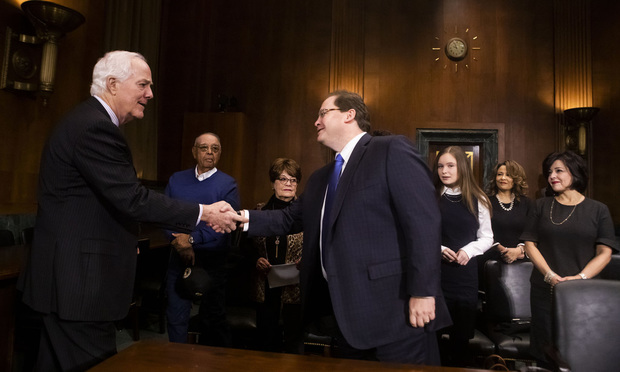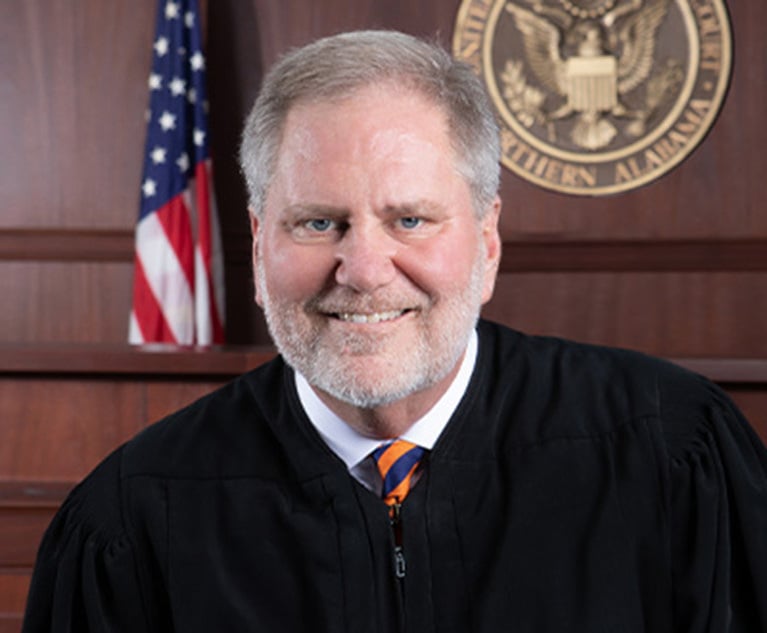Republicans Heap Praise on Eastern District of Texas Nominee Sean Jordan
Eastern District of Texas judicial nominee Sean Jordan encountered little resistance at a sparsely attended Senate Judiciary Committee hearing Tuesday.Sens.…
March 05, 2019 at 01:41 PM
4 minute read
 Senator John Cornyn (R-TX), left, greets Sean Jordan, nominee to be U.S. District Judge for the Eastern District of Texas, before the start of his Senate Judiciary Committee confirmation hearing, on Tuesday, March 5, 2019. Photo: Diego M. Radzinschi/ALM
Senator John Cornyn (R-TX), left, greets Sean Jordan, nominee to be U.S. District Judge for the Eastern District of Texas, before the start of his Senate Judiciary Committee confirmation hearing, on Tuesday, March 5, 2019. Photo: Diego M. Radzinschi/ALM
Eastern District of Texas judicial nominee Sean Jordan encountered little resistance at a sparsely attended Senate Judiciary Committee hearing Tuesday.
Sens. John Cornyn and Ted Cruz, both R-Texas, lavished praise on Jordan while Sen. Richard Blumenthal, D-Connecticut, pressed him on various U.S. Supreme Court precedents. Committee Chairman Lindsey Graham, R-South Carolina, was not present for the hearing, but Cornyn said at the end of the session that he was hopeful Graham would soon hold a vote for Jordan and Mark Pittman, a nominee for the Northern District of Texas who was also questioned Tuesday.
Jordan is with Jackson Walker in Austin, where he co-chairs the firm's Appellate Practice Group, and previously served in the office of Solicitor General for the State of Texas.
Cruz, a former Texas solicitor general who hired Jordan as an assistant solicitor general and later promoted him to a deputy solicitor general, praised Jordan's service in the U.S. Army as an infantryman and paratrooper in the 82nd Airborne Division.
“I will tell you, Sean brings his background as a paratrooper to practicing law, because in major cases, Sean was always the person you could count on to jump on the grenade and handle the most difficult issues,” Cruz said.
Cornyn asked Jordan, a Connecticut native who attended the University of Texas at Austin for undergrad and law school, to describe his military service and how he came to settle in Texas.
“I consider my experience in the military transformative—it was a tremendous honor to serve our country,” Jordan said. “People I met in the Army strongly recommended I go to the University of Texas. That is how I wound up being in Texas. It was the best decision I ever made.”
Blumenthal, the only Democrat in attendance, noted that Jordan participated in preparation of amicus curiae briefs for Texas in two landmark gun control cases, District of Columbia v. Heller in 2008 and McDonald v. Chicago in 2010. Blumenthal noted that the Judiciary Committee will soon hold hearings on a so-called red flag statute, which allows law enforcement officers to seek a court order taking guns away from someone who is considered dangerous.
“Do you view that statute as inconsistent with the positions you have taken in Heller and McDonald?” Blumenthal asked.
“I believe the Heller decision acknowledges there is an individual right to keep and bear arms. Because I'm appearing before this committee as a nominee, I believe it would be inappropriate to comment on pending legislation,” Jordan said.
Blumenthal also asked Jordan if he believed Brown v. Board of Education, the landmark Supreme Court decision desegregating schools, was correctly decided.
“That is a landmark decision of the United States Supreme Court,” Jordan replied. “It overturned Plessy. I would faithfully apply that precedent as I would all Supreme Court precedent.”
Blumenthal went on to ask Jordan to ask if he believed Roe v. Wade, the 1973 ruling declaring the right to abortions, was correctly decided. Jordan replied that he didn't “think it would be appropriate to comment on its correctness. I assure you I would faithfully apply Roe and every Supreme Court decision.
Blumenthal later remarked that he was “disappointed” with Jordan's responses to those questions. “I believe personal beliefs are important. Often applying the law isn't simply a rote or algorithmic exercise. I hope you will have the courage of commitment because you will be the face and voice of justice if you are confirmed.”
Blumenthal has repeatedly questioned President Donald Trump's nominees about Brown and Roe. A question on Brown v. Board of Education tripped up Wendy Vitter, a district court nominee for Louisiana, who faced backlash from civil rights groups afterward. Her nomination is currently pending.
“I don't mean to be coy,” Vitter said during her April 2018 hearing. “But I think I can get into a difficult, difficult area when I start commenting on Supreme Court decisions—which are correctly decided and which I may disagree with.”
She added that the ruling “is Supreme Court precedent. It is binding. If I were honored to be confirmed, I would be bound by it and of course I would uphold it.”
This content has been archived. It is available through our partners, LexisNexis® and Bloomberg Law.
To view this content, please continue to their sites.
Not a Lexis Subscriber?
Subscribe Now
Not a Bloomberg Law Subscriber?
Subscribe Now
NOT FOR REPRINT
© 2025 ALM Global, LLC, All Rights Reserved. Request academic re-use from www.copyright.com. All other uses, submit a request to [email protected]. For more information visit Asset & Logo Licensing.
You Might Like
View All



A Judge Ordered Squabbling Lawyers to Have Lunch: Here's What Happened
Trending Stories
- 1Decision of the Day: Court Holds Accident with Post Driver Was 'Bizarre Occurrence,' Dismisses Action Brought Under Labor Law §240
- 2Judge Recommends Disbarment for Attorney Who Plotted to Hack Judge's Email, Phone
- 3Two Wilkinson Stekloff Associates Among Victims of DC Plane Crash
- 4Two More Victims Alleged in New Sean Combs Sex Trafficking Indictment
- 5Jackson Lewis Leaders Discuss Firm's Innovation Efforts, From Prompt-a-Thons to Gen AI Pilots
Who Got The Work
J. Brugh Lower of Gibbons has entered an appearance for industrial equipment supplier Devco Corporation in a pending trademark infringement lawsuit. The suit, accusing the defendant of selling knock-off Graco products, was filed Dec. 18 in New Jersey District Court by Rivkin Radler on behalf of Graco Inc. and Graco Minnesota. The case, assigned to U.S. District Judge Zahid N. Quraishi, is 3:24-cv-11294, Graco Inc. et al v. Devco Corporation.
Who Got The Work
Rebecca Maller-Stein and Kent A. Yalowitz of Arnold & Porter Kaye Scholer have entered their appearances for Hanaco Venture Capital and its executives, Lior Prosor and David Frankel, in a pending securities lawsuit. The action, filed on Dec. 24 in New York Southern District Court by Zell, Aron & Co. on behalf of Goldeneye Advisors, accuses the defendants of negligently and fraudulently managing the plaintiff's $1 million investment. The case, assigned to U.S. District Judge Vernon S. Broderick, is 1:24-cv-09918, Goldeneye Advisors, LLC v. Hanaco Venture Capital, Ltd. et al.
Who Got The Work
Attorneys from A&O Shearman has stepped in as defense counsel for Toronto-Dominion Bank and other defendants in a pending securities class action. The suit, filed Dec. 11 in New York Southern District Court by Bleichmar Fonti & Auld, accuses the defendants of concealing the bank's 'pervasive' deficiencies in regards to its compliance with the Bank Secrecy Act and the quality of its anti-money laundering controls. The case, assigned to U.S. District Judge Arun Subramanian, is 1:24-cv-09445, Gonzalez v. The Toronto-Dominion Bank et al.
Who Got The Work
Crown Castle International, a Pennsylvania company providing shared communications infrastructure, has turned to Luke D. Wolf of Gordon Rees Scully Mansukhani to fend off a pending breach-of-contract lawsuit. The court action, filed Nov. 25 in Michigan Eastern District Court by Hooper Hathaway PC on behalf of The Town Residences LLC, accuses Crown Castle of failing to transfer approximately $30,000 in utility payments from T-Mobile in breach of a roof-top lease and assignment agreement. The case, assigned to U.S. District Judge Susan K. Declercq, is 2:24-cv-13131, The Town Residences LLC v. T-Mobile US, Inc. et al.
Who Got The Work
Wilfred P. Coronato and Daniel M. Schwartz of McCarter & English have stepped in as defense counsel to Electrolux Home Products Inc. in a pending product liability lawsuit. The court action, filed Nov. 26 in New York Eastern District Court by Poulos Lopiccolo PC and Nagel Rice LLP on behalf of David Stern, alleges that the defendant's refrigerators’ drawers and shelving repeatedly break and fall apart within months after purchase. The case, assigned to U.S. District Judge Joan M. Azrack, is 2:24-cv-08204, Stern v. Electrolux Home Products, Inc.
Featured Firms
Law Offices of Gary Martin Hays & Associates, P.C.
(470) 294-1674
Law Offices of Mark E. Salomone
(857) 444-6468
Smith & Hassler
(713) 739-1250






